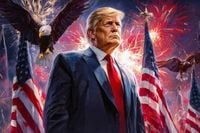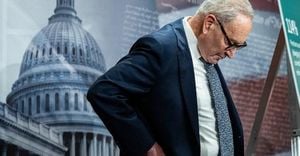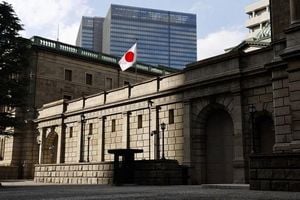In a dramatic twist that has both Washington insiders and the broader American public on edge, President Donald Trump’s relentless push to prosecute his political adversaries is igniting fierce debate about the boundaries of presidential power and the future of American democracy. The latest developments, reported on October 1, 2025, have seen the Justice Department indict former FBI Director James Comey, while also considering charges against Senator Adam Schiff and New York Attorney General Letitia James—two long-standing thorns in Trump’s side. The legal basis for these actions, however, appears increasingly tenuous, raising alarm among legal experts and even some within Trump’s own administration.
FBI Director Kash Patel set the tone, describing Comey’s indictment as a direct response to the so-called “Russiagate hoax.” According to reporting by Creators Syndicate, Patel’s framing ties the charges to Trump’s enduring grievances over the FBI’s investigation into alleged links between his 2016 campaign and the Russian government—an inquiry that led to Comey’s firing in 2017 and cemented his place on Trump’s enemies list. Yet, as legal observers quickly noted, the actual indictment against Comey is rooted in a completely separate matter: the FBI’s 2016 probe of the Clinton Foundation. The charges allege that Comey authorized the unauthorized disclosure of information about that investigation and then lied about it during a 2020 Senate Judiciary Committee hearing.
Legal experts have not been kind to the indictment. Former federal prosecutor Andrew C. McCarthy, writing in National Review, called the case “so ill-conceived and incompetently drafted” that Comey “should be able to get it thrown out on a pretrial motion to dismiss.” This critique is especially striking given McCarthy’s previous alignment with Trump’s criticisms of the Russia probe. In short, even those sympathetic to Trump’s broader complaints about politicized law enforcement are skeptical of the legal merits of the case against Comey.
The timing of the indictment has only fueled suspicions that the move is more about political retribution than the impartial pursuit of justice. Lindsey Halligan, a Trump-appointed U.S. attorney, secured the indictment just three days after assuming office—five days before the statutory deadline and, crucially, five days after Trump publicly pressed Attorney General Pam Bondi to act. “We can’t delay any longer,” Trump declared on Truth Social, explicitly naming Schiff and James as additional targets for prosecution. In that same post, he insisted, “they’re all guilty as hell.”
But what, exactly, are Schiff and James accused of? Schiff, a Democratic senator from California, played a central role in Trump’s first impeachment and served on the House select committee investigating the January 6, 2021, riot at the U.S. Capitol. Letitia James, the Attorney General of New York, famously sued Trump for business fraud, securing a massive “disgorgement” order that was later overturned by a state appeals court—though the court agreed she had provided sufficient evidence to support her claims. The Justice Department is reportedly mulling mortgage fraud charges against both Schiff and James, alleging they improperly claimed more than one home as a primary residence. Whether there is sufficient evidence for such charges is unclear, but as Creators Syndicate points out, this seems beside the point for Trump, who views legal action as a means of exacting revenge on those he believes have wronged him.
Trump’s public and persistent demands for prosecution—most notably his emphatic “JUSTICE MUST BE SERVED, NOW!!!” directed at Bondi—have alarmed not just his critics, but also some of his closest allies within the administration. According to a recent Zeteo report by Asawin Suebsaeng and Andrew Perez, Trump’s top officials are broadly supportive of his aggressive efforts to jail political foes, regardless of whether actual crimes have been committed. Yet, several administration officials privately expressed concern that Trump’s very public interventions could actually undermine these efforts. As one senior official confided, the president’s outbursts might make it harder to successfully charge, convict, and imprison his adversaries, as they risk tainting the legal process and providing ammunition for defense attorneys to argue political motivation.
“Trump is bullying his own government to prosecute his political foes, whether or not there’s actually a criminal case,” Zeteo reported, capturing the sense of unease among some in the administration. The concern is that Trump’s heavy-handed approach could backfire, sabotaging his own aims by making it easier for defense teams to argue that prosecutions are little more than political vendettas.
This is not the first time Trump’s pursuit of his enemies has raised eyebrows. His firing of Comey in 2017 was, by his own admission, motivated by frustration over the Russia investigation. Since then, Trump has made no secret of his desire to punish those he perceives as having orchestrated or enabled what he calls the “witch hunt” against him. But the legal cases now being advanced appear to have little or nothing to do with those original grievances, and more to do with finding any plausible pretext to prosecute.
The legal community is watching closely. The fact that neither career prosecutors nor Erik Siebert, the former U.S. attorney for the Eastern District of Virginia, thought the Comey case was worth pursuing speaks volumes. It was only after Halligan, a Trump loyalist, took the reins that the indictment moved forward. This sequence of events, coupled with Trump’s public pressure campaign, has led many to conclude that the president is conflating justice with revenge.
Even among Trump’s most ardent supporters, there’s a sense that the president’s personal crusade risks undermining the very institutions he claims to defend. For those on the other side of the political spectrum, the spectacle of a sitting president using the machinery of government to target his enemies is a chilling sign of creeping authoritarianism. Yet, as Zeteo notes, the irony is that Trump’s own actions may be making it harder, not easier, to achieve his stated goals.
As the Justice Department weighs its next moves, the nation is left to grapple with a fundamental question: where is the line between the legitimate pursuit of justice and the dangerous politicization of the law? With the stakes as high as they’ve ever been, the outcome of these cases—and the manner in which they’re pursued—will reverberate far beyond the fate of Comey, Schiff, and James.
The coming months promise to test not only the resilience of America’s legal institutions, but also the nation’s collective commitment to the rule of law over the passions of the moment. All eyes are on Washington, waiting to see just how far the president—and those around him—are willing to go.




